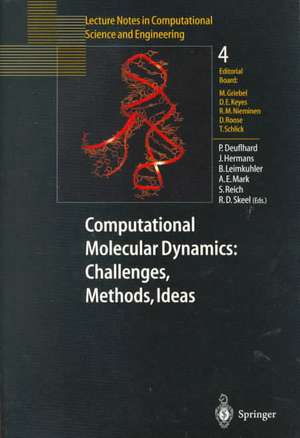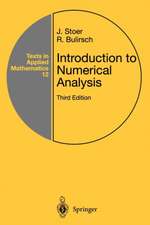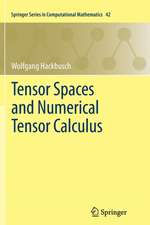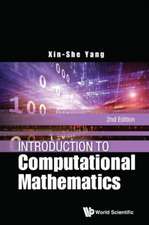Computational Molecular Dynamics: Challenges, Methods, Ideas: Proceeding of the 2nd International Symposium on Algorithms for Macromolecular Modelling, Berlin, May 21–24, 1997: Lecture Notes in Computational Science and Engineering, cartea 4
Editat de Peter Deuflhard, Jan Hermans, Benedict Leimkuhler, Alan E. Mark, Sebastian Reich, Robert D. Skeelen Limba Engleză Paperback – 24 noi 1998
The 29 articles of the book reflect the main topics of the Berlin meeting which were i) Conformational Dynamics, ii) Thermodynamic Modelling, iii) Advanced Time-Stepping Algorithms, iv) Quantum-Classical Simulations and Fast Force Field and v) Fast Force Field Evaluation.
Din seria Lecture Notes in Computational Science and Engineering
-
 Preț: 375.63 lei
Preț: 375.63 lei - 18%
 Preț: 1247.70 lei
Preț: 1247.70 lei - 18%
 Preț: 787.15 lei
Preț: 787.15 lei -
 Preț: 384.31 lei
Preț: 384.31 lei - 20%
 Preț: 990.95 lei
Preț: 990.95 lei - 15%
 Preț: 648.56 lei
Preț: 648.56 lei - 15%
 Preț: 653.00 lei
Preț: 653.00 lei -
 Preț: 405.28 lei
Preț: 405.28 lei - 18%
 Preț: 976.06 lei
Preț: 976.06 lei - 18%
 Preț: 968.82 lei
Preț: 968.82 lei -
 Preț: 397.97 lei
Preț: 397.97 lei - 18%
 Preț: 962.49 lei
Preț: 962.49 lei - 15%
 Preț: 647.08 lei
Preț: 647.08 lei - 15%
 Preț: 648.56 lei
Preț: 648.56 lei - 15%
 Preț: 649.54 lei
Preț: 649.54 lei - 18%
 Preț: 1389.30 lei
Preț: 1389.30 lei -
 Preț: 428.30 lei
Preț: 428.30 lei - 18%
 Preț: 1240.62 lei
Preț: 1240.62 lei - 20%
 Preț: 666.27 lei
Preț: 666.27 lei - 15%
 Preț: 654.43 lei
Preț: 654.43 lei - 15%
 Preț: 644.30 lei
Preț: 644.30 lei - 18%
 Preț: 957.62 lei
Preț: 957.62 lei - 18%
 Preț: 1224.18 lei
Preț: 1224.18 lei - 18%
 Preț: 904.11 lei
Preț: 904.11 lei - 18%
 Preț: 1242.83 lei
Preț: 1242.83 lei - 20%
 Preț: 992.11 lei
Preț: 992.11 lei - 15%
 Preț: 642.83 lei
Preț: 642.83 lei - 18%
 Preț: 954.45 lei
Preț: 954.45 lei - 18%
 Preț: 783.20 lei
Preț: 783.20 lei - 18%
 Preț: 949.42 lei
Preț: 949.42 lei - 15%
 Preț: 642.83 lei
Preț: 642.83 lei - 18%
 Preț: 964.86 lei
Preț: 964.86 lei - 18%
 Preț: 1260.83 lei
Preț: 1260.83 lei - 15%
 Preț: 650.37 lei
Preț: 650.37 lei
Preț: 651.19 lei
Preț vechi: 766.10 lei
-15% Nou
Puncte Express: 977
Preț estimativ în valută:
124.61€ • 130.43$ • 103.71£
124.61€ • 130.43$ • 103.71£
Carte tipărită la comandă
Livrare economică 31 martie-14 aprilie
Preluare comenzi: 021 569.72.76
Specificații
ISBN-13: 9783540632429
ISBN-10: 3540632425
Pagini: 516
Ilustrații: XI, 494 p. 120 illus., 1 illus. in color.
Dimensiuni: 155 x 235 x 27 mm
Greutate: 0.72 kg
Ediția:Softcover reprint of the original 1st ed. 1999
Editura: Springer Berlin, Heidelberg
Colecția Springer
Seria Lecture Notes in Computational Science and Engineering
Locul publicării:Berlin, Heidelberg, Germany
ISBN-10: 3540632425
Pagini: 516
Ilustrații: XI, 494 p. 120 illus., 1 illus. in color.
Dimensiuni: 155 x 235 x 27 mm
Greutate: 0.72 kg
Ediția:Softcover reprint of the original 1st ed. 1999
Editura: Springer Berlin, Heidelberg
Colecția Springer
Seria Lecture Notes in Computational Science and Engineering
Locul publicării:Berlin, Heidelberg, Germany
Public țintă
ResearchCuprins
Introductory Survey.- Molecular Dynamics Simulations: The Limits and Beyond.- I Conformational Dynamics.- Steered Molecular Dynamics.- Conformational Transitions of Proteins from Atomistic Simulations.- Conformational Dynamics Simulations of Proteins.- Computation of Essential Molecular Dynamics by Subdivision Techniques.- Mathematical Model of the Nucleic Acids Conformational Transitions with Hysteresis over Hydration-Dehydration Cycle.- II Thermodynamic Modelling.- Simulation Studies of Protein-Ligand Interactions.- Estimating Relative Free Energies from a Single Simulation of the Initial State.- Exploration of Peptide Free Energy Surfaces.- Prediction of pKas of Titratable Residues in Proteins Using a Poisson-Boltzmann Model of the Solute-Solvent System.- Exploiting Tsallis Statistics.- New Techniques for the Construction of Residue Potentials for Protein Folding.- III Enhanced Time-Stepping Algorithms.- Some Failures and Successes of Long-Timestep Approaches to Biomolecular Simulations.- Application of a Stochastic Path Integral Approach to the Computations of an Optimal Path and Ensembles of Trajectories.- On Some Difficulties in Integrating Highly Oscillatory Hamiltonian Systems.- Molecular Dynamics in Systems with Multiple Time Scales: Reference System Propagator Algorithms.- The Five Femtosecond Time Step Barrier.- Long Time Step MD Simulations Using Split Integration Symplectic Method.- Comparison of Geometric Integrators for Rigid Body Simulation.- IV Quantum-Classical Simulations.- New Methods in Quantum Molecular Dynamics of Large Polyatomic Systems.- Approximation Properties and Limits of the Quantum-Classical Molecular Dynamics Model.- Numerical Integrators for Quantum-Classical Molecular Dynamics.- Symplectic Multiple-Time-Stepping Integrators for Quantum-Classical Molecular Dynamics.- A Bunch of Time Integrators for Quantum/Classical Molecular Dynamics.- Applications of Ab-Initio Molecular Dynamics Simulations in Chemistry and Polymer Science.- Polarons of Molecular Crystal Model by Nonlocal Dynamical Coherent Potential Method.- V Parallel Force Field Evaluation.- Ewald and Multipole Methods for PeriodicN-Body Problems.- Avoiding Algorithmic Obfuscation in a Message-Driven Parallel MD Code.- Parallel Molecular Dynamics Using Force Decomposition.
Textul de pe ultima copertă
On May 21-24, 1997 the Second International Symposium on Algorithms for Macromolecular Modelling was held at the Konrad Zuse Zentrum in Berlin. The event brought together computational scientists in fields like biochemistry, biophysics, physical chemistry, or statistical physics and numerical analysts as well as computer scientists working on the advancement of algorithms, for a total of over 120 participants from 19 countries. In the course of the symposium, the speakers agreed to produce a representative volume that combines survey articles and original papers (all refereed) to give an impression of the present state of the art of Molecular Dynamics.
The 29 articles of the book reflect the main topics of the Berlin meeting which were i) Conformational Dynamics, ii) Thermodynamic Modelling, iii) Advanced Time-Stepping Algorithms, iv) Quantum-Classical Simulations and Fast Force Field and v) Fast Force Field Evaluation.
The 29 articles of the book reflect the main topics of the Berlin meeting which were i) Conformational Dynamics, ii) Thermodynamic Modelling, iii) Advanced Time-Stepping Algorithms, iv) Quantum-Classical Simulations and Fast Force Field and v) Fast Force Field Evaluation.















